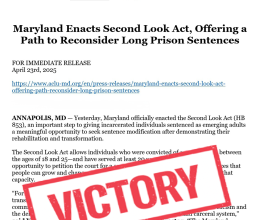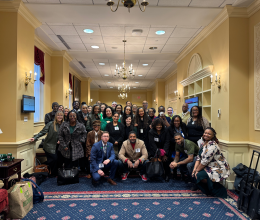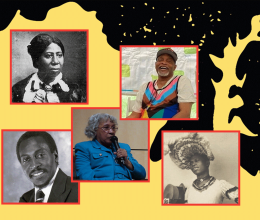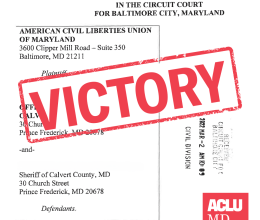
CONTACTS:
Meredith Curtis, ACLU of Maryland 410-889-8555, media@aclu-md.org
Gerald Stansbury, Maryland State Conference of NAACP Branches, 443-235-8126, stansger@yahoo.com
WHAT: Court hearing in Dashiell v. Maryland State Police; the ACLU of Maryland is asking the Court of Special Appeals to overturn a lower court ruling permitting the department to shield all records of complaint investigations from public scrutiny. The challenge comes in the case of a Somerset County woman, Teleta S. Dashiell, who is seeking information related to MSP's handling of her complaint about a voicemail message she received from a state trooper in which he twice uses a racial slur. The ACLU appeal argues that MSP's blanket refusal to disclose any information about its investigation of Dashiell's complaint, or about any corrective actions taken in response, is illegal and undermines trust with communities troopers are sworn to serve.
WHO: Sonia Kumar, Attorney, ACLU of Maryland; Deborah Jeon, Legal Director, ACLU of Maryland; Gerald Stansbury, President, Maryland State Conference of NAACP Branches; many additional members of NAACP Branches in Maryland.
WHEN: Thursday, October 4, 2012 at 9:30 am.
WHERE: Court of Special Appeals, Courtroom 2, 361 Rowe Boulevard Annapolis, MD 21401.
BACKGROUND: On November 5, 2009, Maryland State Police Sergeant John Maiello left an offensive voicemail message containing a racial slur on the cell phone of Teleta Dashiell, a resident of Somerset County. Although the MSP closed their investigation into the incident during the second week of February 2010, they have refused to release any details of the content or results of the investigation or whether Sergeant Maiello, who remains a state trooper, was reprimanded or disciplined in any way.
A 2010 en banc decision by the Maryland Court of Special Appeals in a public information case concerning racial profiling complaints brought against the MSP by the ACLU and NAACP held that MSP should produce such investigatory records.
The appeals court said: "Racial profiling complaints against Maryland State Troopers do not involve private matters concerning intimate details of the trooper's private life. Instead, such complaints involve events occurring while the trooper is on duty and engaged in public service. As such, the files at issue concern public actions by agents of the State concerning affairs of government, which are exactly the types of material the Act was designed to allow the public to see."






